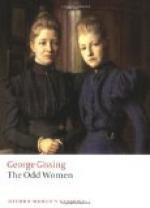The magnificent summer sunshine, and the western breeze that tasted of ocean, heightened his natural cheeriness. Dr. Madden fell into a familiar strain of prescience.
’There will come a day, Alice, when neither man nor woman is troubled with such sordid care. Not yet awhile; no, no; but the day will come. Human beings are not destined to struggle for ever like beasts of prey. Give them time; let civilization grow. You know what our poet says: “There the common sense of most shall hold a fretful realm in awe—“’
He quoted the couplet with a subdued fervour which characterized the man and explained his worldly lot. Elkanah Madden should never have entered the medical profession; mere humanitarianism had prompted the choice in his dreamy youth; he became an empiric, nothing more. ‘Our poet,’ said the doctor; Clevedon was chiefly interesting to him for its literary associations. Tennyson he worshipped; he never passed Coleridge’s cottage without bowing in spirit. From the contact of coarse actualities his nature shrank.
When he and Alice returned from their walk it was the hour of family tea. A guest was present this afternoon; the eight persons who sat down to table were as many as the little parlour could comfortably contain. Of the sisters, next in age to Alice came Virginia, a pretty but delicate girl of seventeen. Gertrude, Martha, and Isabel, ranging from fourteen to ten, had no physical charm but that of youthfulness; Isabel surpassed her eldest sister in downright plainness of feature. The youngest, Monica, was a bonny little maiden only just five years old, dark and bright-eyed.
The parents had omitted no care in shepherding their fold. Partly at home, and partly in local schools, the young ladies had received instruction suitable to their breeding, and the elder ones were disposed to better this education by private study. The atmosphere of the house was intellectual; books, especially the poets, lay in every room. But it never occurred to Dr. Madden that his daughters would do well to study with a professional object. In hours of melancholy he had of course dreaded the risks of life, and resolved, always with postponement, to make some practical provision for his family; in educating them as well as circumstances allowed, he conceived that he was doing the next best thing to saving money, for, if a fatality befell, teaching would always be their resource. The thought, however, of his girls having to work for money was so utterly repulsive to him that he could never seriously dwell upon it. A vague piety supported his courage. Providence would not deal harshly with him and his dear ones. He enjoyed excellent health; his practice decidedly improved. The one duty clearly before him was to set an example of righteous life, and to develop the girls’ minds— in every proper direction. For, as to training them for any path save those trodden by English ladies of the familiar type, he could not have dreamt of any such thing. Dr. Madden’s hopes for the race were inseparable from a maintenance of morals and conventions such as the average man assumes in his estimate of women.




